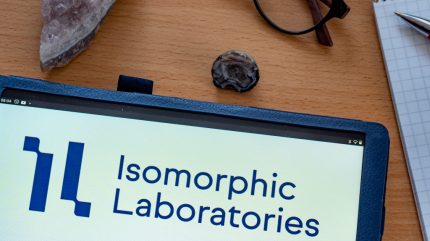
Isomorphic Labs has raised $600m in its first external funding round as it pushes forward with artificial intelligence (AI)-driven drug discovery.
Thrive Capital led the financing round, with participation from Google Ventures, and follow-on capital from existing backer, Alphabet.

Discover B2B Marketing That Performs
Combine business intelligence and editorial excellence to reach engaged professionals across 36 leading media platforms.
The Google-backed company – founded in 2021 by Demis Hassabis – has not disclosed specific plans for the funding. However, in a statement, Hassabis said the investment would accelerate the development of Isomorphic’s AI drug design engine and help advance its programmes into clinical development.
“This funding will further turbocharge the development of our next-generation AI drug design engine, help us advance our own programmes into clinical development, and is a significant step forward towards our mission of one day solving all disease with the help of AI,” Hassabis stated.
Since its launch, Isomorphic Labs has focused on using AI to model biological processes and accelerate drug discovery. The company co-developed AlphaFold 3 with Google DeepMind, an AI model capable of accurately predicting complex protein structures and molecular interactions.
Hassabis, who won the 2024 Nobel Prize in Chemistry for his work on AlphaFold, has previously explained that Isomorphic’s strategy focuses on algorithmic innovation rather than building wet labs, as he believes there is “still a lot of juice to be squeezed” from existing data sources through advanced techniques like synthetic data generation. These comments were made at the Financial Times (FT) Pharma and Biotech Summit in London on 6 November 2024.

US Tariffs are shifting - will you react or anticipate?
Don’t let policy changes catch you off guard. Stay proactive with real-time data and expert analysis.
By GlobalDataAI’s role in drug discovery has grown significantly over the past decade, helping pharmaceutical companies identify lead compounds, optimise clinical trials, and repurpose existing drugs. The surge in AI-driven research has led to a wave of high-value partnerships between biotech firms and major pharmaceutical companies.
Isomorphic has been at the centre of this trend, securing major deals with Eli Lilly and Novartis in January 2024 worth nearly $3bn combined. In February 2025, the company extended its partnership with Novartis to include up to three additional research programmes, maintaining the financial terms of the original agreement.
Other notable AI-driven deals in the sector include Novo Nordisk’s $2.76bn partnership with Valo Health and Bayer’s $1.5bn agreement with Recursion Pharmaceuticals. Other pharma companies that specifically use AI to drive their pipelines include BenevolentAI, Exscientia, and Insilico Medicine.
Beyond these headline deals, AI is increasingly being integrated up and down the drug development process. Many pharmaceutical companies now use AI for clinical trial design, patient recruitment, regulatory submissions, and data analysis. While enthusiasm and investment into AI-driven drug discovery continue to grow, challenges remain. Data scarcity, biological complexity, and regulatory uncertainty are persistent obstacles for companies looking to bring AI-designed drugs to market.
Despite these hurdles, a recent GlobalData survey has identified AI as one of the most disruptive technologies among businesses, including in the healthcare industry.
GlobalData is the parent company of Pharmaceutical Technology.




